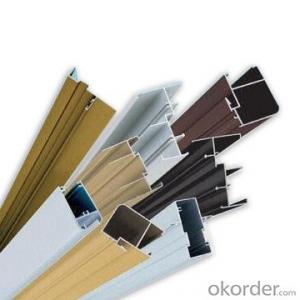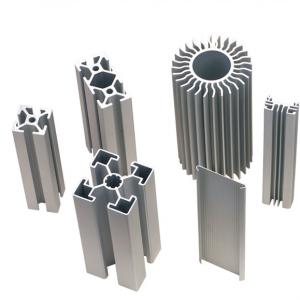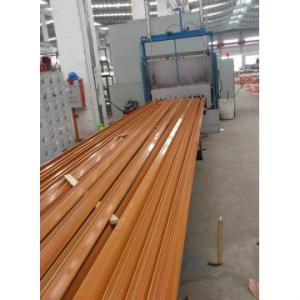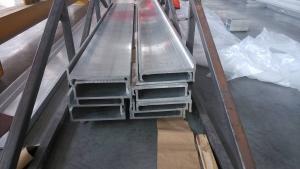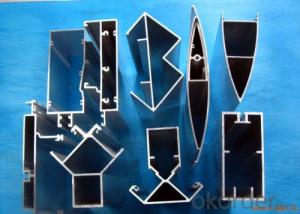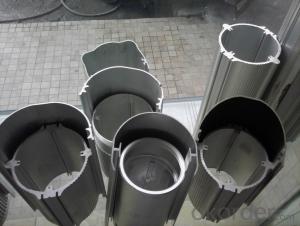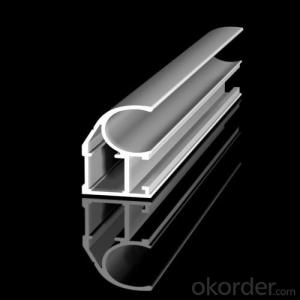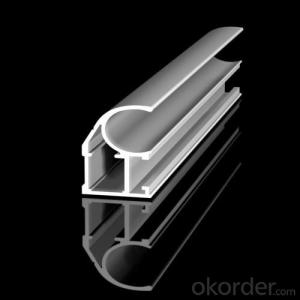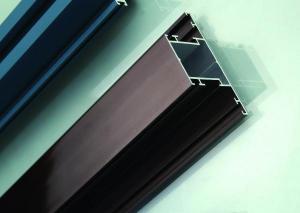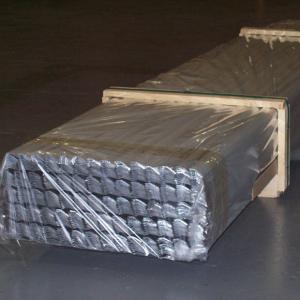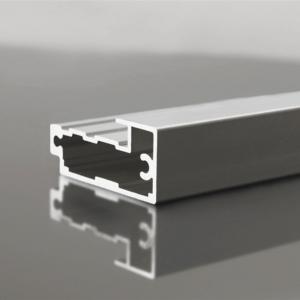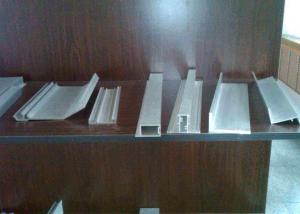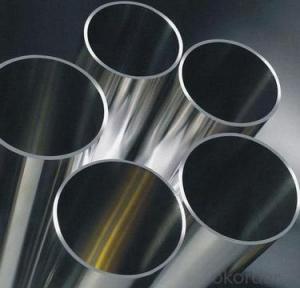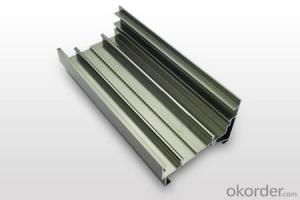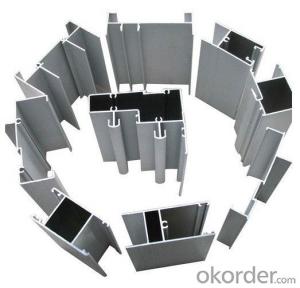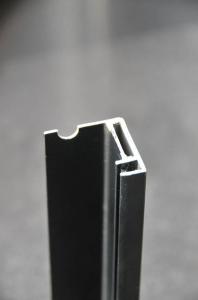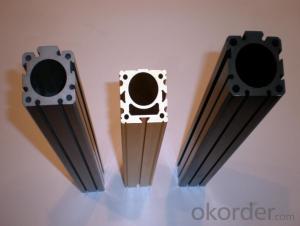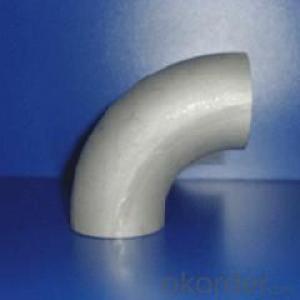Anodized and Powder Coated Aluminum Profile
OKorder Service Pledge
OKorder Financial Service
You Might Also Like
Aluminium is a relatively soft, durable, lightweight, ductileand malleablemetalwith appearance ranging from silvery to dull gray, depending on the surfaceroughness. It is nonmagnetic and does not easily ignite. A fresh film ofaluminium serves as a good reflector (approximately 92%) of visible lightand an excellent reflector (as much as 98%) of medium and far infraredradiation. The yield strength of pure aluminium is 7–11 MPa,while aluminium alloys have yield strengths ranging from200 MPa to 600 MPa. Aluminium has about one-third the densityand stiffness of steel. It is easily machined,cast, drawn and extruded.
Features:
Material | Alloy 6063,6061,6005or according to customer’s choice |
Temper | T3, T4, T5, T6 |
Surface | Anodize, electrophoresis, powder coating, PVDF coating, wood grain painting, matted, etc. |
Length | Coating 6.5 meters, Anodizing 6.5 meters, Mill finish 5 meters |
Application | Industrial, electrical equipment(TV set, air conditioner, refrigerator, computer), decoration,construction, transportation |
Custom Made | We can package following with customer's request. |
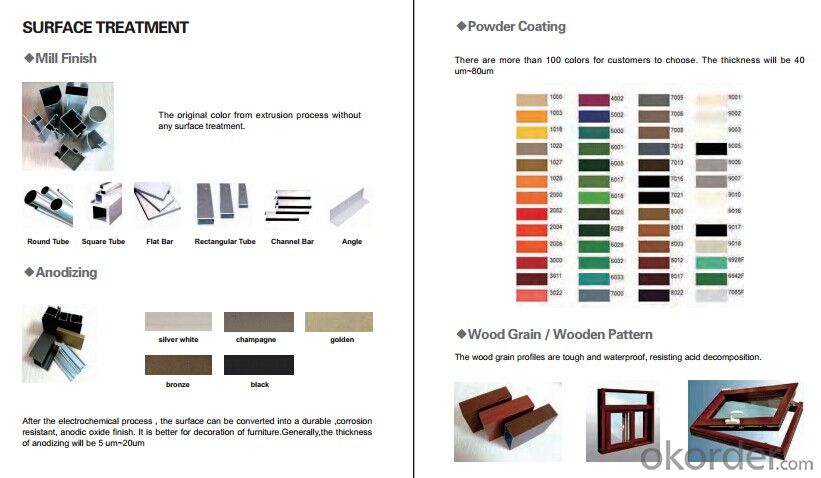
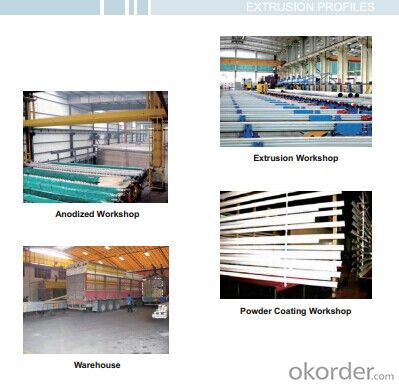
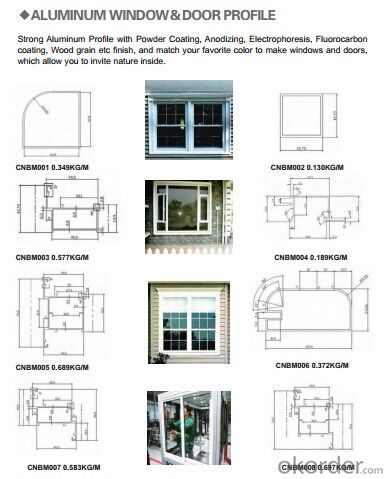
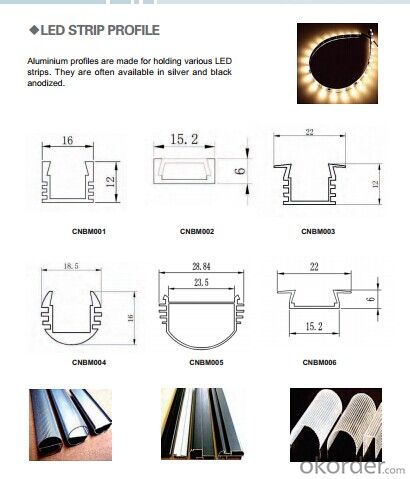
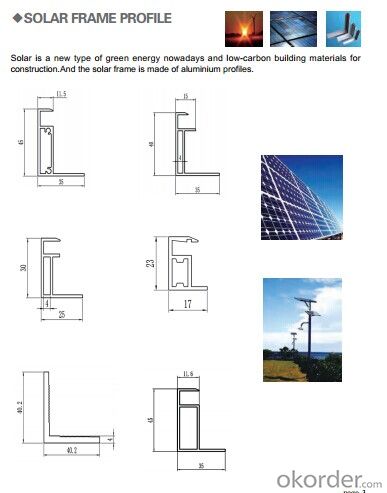
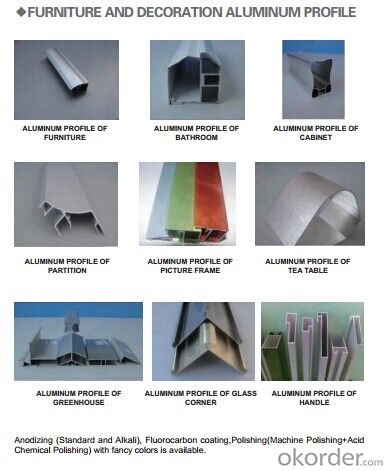
- Q:What are the recycling capabilities of aluminum profiles?
- Aluminum profiles have excellent recycling capabilities. They can be easily recycled without losing their quality or properties. The recycling process involves melting the profiles down, removing any impurities, and then casting them into new shapes or products. This recycling process can be repeated indefinitely, making aluminum profiles a highly sustainable and eco-friendly material.
- Q:Are aluminum profiles suitable for use in the marine industry?
- Yes, aluminum profiles are suitable for use in the marine industry. Aluminum is a lightweight, durable, and corrosion-resistant material, making it ideal for various marine applications, including boat building, shipbuilding, and offshore structures. Its high strength-to-weight ratio allows for efficient and reliable construction, while its resistance to saltwater and harsh environmental conditions ensures longevity. Additionally, aluminum profiles can be easily fabricated, providing flexibility in design and customization. Overall, aluminum profiles offer numerous advantages that make them well-suited for use in the marine industry.
- Q:Can aluminum profiles be used for exhibition stands?
- Yes, aluminum profiles can be used for exhibition stands. Aluminum profiles are lightweight and versatile, making them an ideal choice for exhibition stands. They can be easily assembled and disassembled, allowing for easy transportation and storage. Additionally, aluminum profiles can be customized to fit the specific design and layout requirements of an exhibition stand. They can be used to create frames, partitions, and display panels, providing a sturdy and professional-looking structure. The use of aluminum profiles in exhibition stands also offers the flexibility to add accessories such as lighting fixtures, shelving, and signage, further enhancing the overall visual appeal and functionality of the stand.
- Q:Are aluminum profiles suitable for historical or heritage restoration projects?
- Yes, aluminum profiles can be suitable for historical or heritage restoration projects. Aluminum is a versatile material that offers several advantages for restoration projects. Firstly, aluminum profiles can be manufactured to replicate traditional architectural features and designs, allowing for seamless integration and preservation of the historical aesthetics. Aluminum is also a lightweight material, making it easier to handle and install, especially in complex or intricate restoration projects. Additionally, aluminum is highly durable and resistant to corrosion, which is crucial for preserving the structural integrity and longevity of historical buildings or structures. Furthermore, aluminum profiles can be easily customized and fabricated to match the specific requirements of historical restoration projects. They can be shaped, cut, and finished to replicate the original architectural elements, such as windows, doors, trim, or decorative features. Moreover, aluminum profiles offer excellent thermal performance, providing improved energy efficiency and insulation for restored buildings. This can help reduce energy consumption, lower heating or cooling costs, and enhance the overall comfort of the space. While traditional materials like wood or steel have been commonly used in historical restoration projects, aluminum profiles offer a modern alternative that combines aesthetic appeal, durability, and sustainability. However, it is important to ensure that the use of aluminum profiles aligns with the preservation guidelines and regulations of the specific historical or heritage project. In conclusion, aluminum profiles can be a suitable choice for historical or heritage restoration projects due to their versatility, durability, lightweight nature, customization options, and energy efficiency. They can successfully blend modern functionality with historical aesthetics, contributing to the preservation and revitalization of our architectural heritage.
- Q:Request recommended professional aluminum manufacturer?
- Jing Long aluminum, aluminum strip and aluminum wafer production capacity of 60000 tons, this piece in Shangqiu, still have the strength, is a professional production and processing, wholesale distribution of aluminum, hot-rolled plate, hot rolled plate, aluminum plate, aluminum plate, roll spindle is the main.
- Q:Can aluminum profiles be used for DIY projects or home improvement?
- Yes, aluminum profiles can be used for DIY projects or home improvement. Aluminum profiles are versatile and can be easily customized and fabricated to fit various applications. They are lightweight, durable, and resistant to corrosion, making them suitable for a wide range of projects such as shelving, framing, furniture, and even outdoor structures like pergolas or fences. Additionally, aluminum profiles are available in different shapes and sizes, allowing for flexible and creative designs.
- Q:What industries commonly use aluminum profiles?
- Aluminum profiles are widely used in various industries due to their unique properties and versatility. One of the most common industries that utilize aluminum profiles is the construction industry. Aluminum profiles are used in the construction of windows, doors, curtain walls, and other architectural applications. The lightweight nature of aluminum makes it an ideal choice for these applications, as it reduces the load on the building structure. The automotive industry also extensively uses aluminum profiles. They are used in the manufacturing of car frames, body panels, and components, as they offer excellent strength-to-weight ratio and corrosion resistance. Aluminum profiles help in reducing the overall weight of vehicles, leading to improved fuel efficiency and performance. The aerospace industry heavily relies on aluminum profiles for aircraft manufacturing. Aluminum profiles are used in the construction of aircraft frames, wings, and fuselages. Their high strength and durability make them suitable for withstanding the rigors of flight, while their lightweight nature contributes to fuel efficiency. The electronics industry also commonly uses aluminum profiles. They are used in the manufacturing of heat sinks, which help dissipate heat from electronic components. Aluminum's excellent thermal conductivity ensures effective heat transfer, preventing damage to sensitive electronic devices. Furthermore, the furniture industry utilizes aluminum profiles in the production of lightweight and durable furniture pieces. Aluminum profiles are used in the construction of frames for chairs, tables, shelves, and various other furniture items. Their corrosion resistance and aesthetic appeal make them a popular choice for both indoor and outdoor furniture. In summary, industries such as construction, automotive, aerospace, electronics, and furniture commonly use aluminum profiles due to their lightweight, strength, corrosion resistance, and versatility. These profiles play a crucial role in enhancing the performance, efficiency, and durability of products in these industries.
- Q:The aluminum panel is the cart, ordinary nylon plate, the wheel is not conductive wheel, why use aluminum surface will be static, but not in the nylon plate, not easy to produce electrostatic in high resistance material?
- The problem is on the oxide film or coating of the aluminum profile!Aluminum is very lively! Very easily in the air and oxygen, carbon dioxide, water oxidation and galvanic reaction generated! White aluminium hydroxide and aluminum carbonate! So that its surface will lose luster! In order to solve this problem! Is usually on the surface of aluminum shaped material is covered with a layer of very thin oxide film or electrostatic synthesis there are also cover coating thin polyester film!! this makes the surface and is completely isolated from the air!
- Q:How much is the aluminium frame Aonaike surface over three thickness? And three prism specifications?
- The thickness of the aluminum profile is 1.8mm, and the size of the three prism is 136126100,80.
- Q:How do you prevent galling or seizing with aluminum profiles?
- To prevent galling or seizing with aluminum profiles, it is important to use proper lubrication. Applying a suitable lubricant, such as a specialized anti-seize compound or a lubricating oil, can significantly reduce friction and prevent the surfaces from sticking together. Additionally, ensuring that the aluminum profiles are clean and free from any contaminants or debris can also help prevent galling or seizing.
1. Manufacturer Overview |
|
|---|---|
| Location | |
| Year Established | |
| Annual Output Value | |
| Main Markets | |
| Company Certifications | |
2. Manufacturer Certificates |
|
|---|---|
| a) Certification Name | |
| Range | |
| Reference | |
| Validity Period | |
3. Manufacturer Capability |
|
|---|---|
| a)Trade Capacity | |
| Nearest Port | |
| Export Percentage | |
| No.of Employees in Trade Department | |
| Language Spoken: | |
| b)Factory Information | |
| Factory Size: | |
| No. of Production Lines | |
| Contract Manufacturing | |
| Product Price Range | |
Send your message to us
Anodized and Powder Coated Aluminum Profile
OKorder Service Pledge
OKorder Financial Service
Similar products
New products
Hot products
Hot Searches
Related keywords
